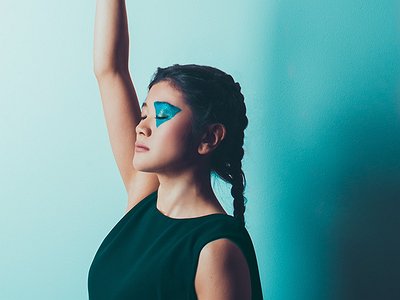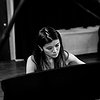Part 1
Name: Erika Dohi
Nationality: Japanese
Occupation: Pianist
Current Release: In Visible Road Festival / RighteousGIRLS ‘gathering blue’ on New Focus Recordings
Recommenation: Craig Taborn’s album ‘Avenging Angel (ECM)’ / Britten’s Suite for Violin and Piano, Op. 6 Part IV Lullaby
Website/Contact:You can find out more about Erica at her website www.erikadohi.com
When did you start playing your instrument, and what or who were your early passions and influences? What is it about music and/or sound that drew you to it?
I started piano at age three. My mother taught piano at home, so I was always surrounded by the sound of it. I still remember feeling really eager to start lessons. I think I was drawn to the beauty of the acoustic sound itself, the sonority of the instrument.
For most artists, originality is first preceded by a phase of learning and, often, emulating others. What was this like for you? How would you describe your own development as an artist and the transition towards your own voice? What is the relationship between copying, learning and your own creativity?
I've always been bad at copying or mimicking, in music and in general. I feel like in order for me to understand or create something, I need to understand the core of it, I need to deeply understand it. If I’m learning a new musical language (for example a style of jazz, or the expressive language of a composer), I need to learn how or why it developed from a musical standpoint, and what it’s expressing. It’s hard for me to ‘fake,’ or to execute things well but superficially. I’m either terrible at conveying something because I don’t fully understand it, or I express it confidently because I grasp the entire context and have formed my own opinion.
I became frustrated with classical music for this reason. Although I’m finally, after finishing my doctorate, feeling confident to express myself through works of a Beethoven or Schubert, it’s taken me many years to more deeply connect with the why and how of composers from centuries past, but with forms of jazz and improvisation, I feel like I’m finding my voice more and more. It’s required persistence, asking a ton of questions, and being really demanding with myself about whether I’m actually, deeply understanding, rather than just going through the motions without feeling connected. To express yourself at the deepest level musically, the language of it (whether it’s classical, jazz or free improv) needs to be instinctual.
I grew up studying piano in Japan, moved to England for boarding school (Purcell School of Music) and basically only studied and played classical piano until I moved to New York City. I cannot stress enough how influential my undergraduate years in NYC were. This was when I really discovered the world of improvisation, and musicians like Vijay Iyer, Jason Moran, and Tyshawn Sorey. I learned most just by listening to them, and the way they expressed themselves so purely and genuinely through improvisation. The experience of hearing someone express ‘their voice’ through music is a hard thing to put into words.
Besides the high-level artists in the city, my year at Banff Music Center in 2013 was a big influence on me. I was lucky to be there for the workshop in jazz and creative music, led by the pianist/composer Vijay Iyer; that summer changed my life. All the musicians I met, both faculty and students, had unique and authentic musical personalities, and all very different from one another. I still keep in touch and work with those people, hopefully forever. Before that summer, the idea of finding ‘my’ sound at the piano didn’t even occur to me. I wasn’t looking.
What were some of your main artistic challenges when starting out as an artist and in which way have they changed over the years?
At first, I said yes to every opportunity because I didn’t know what musical path I wanted to take, and of course when you start out, you appreciate any gigs that come your way. I do think it was helpful and important that I took so many different sorts of gigs, because it exposed me to all different styles and experiences, and kept me constantly challenged. The tougher experiences force you to learn.
Now, I’m a lot pickier about what I say yes to, because I know what interests me musically and I have a better sense of where certain musical opportunities might lead. But I have no regrets – all my experiences have given me something, even just perspective. There have definitely been tough moments, like taking a gig last-minute and playing really badly, and basically just feeling ashamed. Those situations feel like they offer nothing but a bad reputation, but they do help you to understand your capacity.
Tell us about your studio/work space, please. What were criteria when setting it up and how does this environment influence the creative process? How important, relatively speaking, are factors like mood, ergonomics, haptics and technology for you?
I really only need a piano (any piano) and a relatively clean space. My main work space is my apartment, but when I get the opportunity to travel to places with beautiful nature or places abroad, I do get more inspired to write. Mood is important for me. If I don’t feel like practicing, I usually don’t; I might meditate or do yoga or walk my dog instead, and that usually puts me in a better place mentally to get better work done. I don’t force it.
Tell me about your instrument, please. What was your first instrument like and how did you progress to your current one? How would you describe the relationship with it? What are its most important qualities and how do they influence the musical results, including your own performance?
I grew up with a Yamaha (grand) and I have a Yamaha (baby grand) at my apartment in NYC. I remember the excitement and relief when I got my baby grand, while I was in grad school. It’s a deep relationship we develop with our instrument, because we spend thousands of hours playing on it. We get to know it well, and it knows us well. But it’s different than for violinists for example, who get to perform publicly on their instruments. We don’t share that, we need/get to play on whatever piano the venue has to offer, which is tricky if you think about it: we have to express ourselves in front of others in the most personal way, but usually on an instrument that we’ve barely spent any time with. Maybe that makes the bond even stronger, the pianist’s own piano is a more private, personal thing that isn’t really shared.
Could you take us through a day in your life, from a possible morning routine through to your work? Do you have a fixed schedule? How do music and other aspects of your life feed back into each other - do you separate them or instead try to make them blend seamlessly?
The morning hours are important for practicing and creative work. I feel like I get a lot more done when my mind is fresh. My ideal morning is to wake up, meditate for 20 minutes (which I started last year) have coffee blended with coconut oil, and work all morning. Work might mean learning notes for a new piece, practicing for a concert, composing or doing computer work. Now that we have a puppy, a big part of my morning routine is handling her, so it’s been harder for me to find time to meditate.
My daily routine puts me in a mindset for my musical work, so I do take it seriously. A bad morning really affects my productivity for the whole day!
Could you describe your creative process on the basis of a piece or album that's particularly dear to you, please? Where did the ideas come from, how were they transformed in your mind, what did you start with and how do you refine these beginnings into the finished work of art?
I’m actually working on my first solo album right now, which is made up almost entirely of my own compositions and improvisations. I started the process last summer after finishing grad school at Stony Brook University. I was very sad to leave my dear teachers Gil Kalish and Tina Dahl, who had revived and strengthened my love for the classical tradition, including Beethoven, Schubert and Brahms. There had been holes in my understanding and things I just never felt comfortable with, and they remedied that and gave me much more confidence. But after an intense focus on the classical tradition and working on what I felt were my weaknesses, I felt a strong desire to pursue my own voice through composing and improvisation. The timing of it is funny to me. Ever since my inspiring experience at Banff, I had been trying to write (for 5 years), but always felt blocked. All of the sudden, after studying classical music intensely, the inspiration came intensely, and I felt like I had a lot to say right after I graduated. The end of my studies felt like the end of a big chapter for me, and the start of something else. I finally felt ready to write.
The album itself will be a mix of electronic media, acoustic piano sound including prepared piano, and other keyboards. The sound I’m looking for definitely goes beyond the traditional piano sound, but I’m still in process so I can’t say much else definitively. I’m just excited and grateful to be working on my own project and collaborating with a great producer and engineer.






